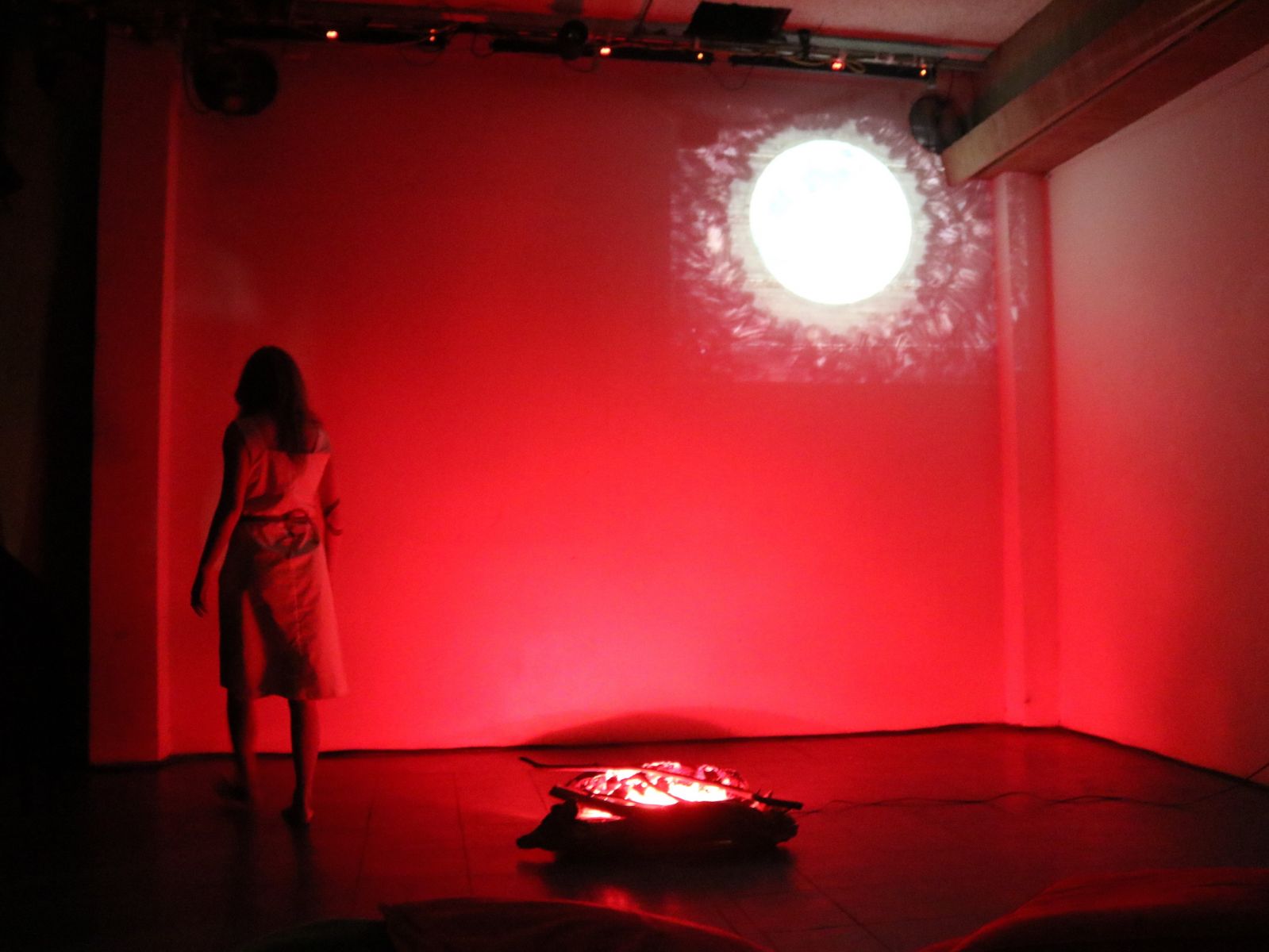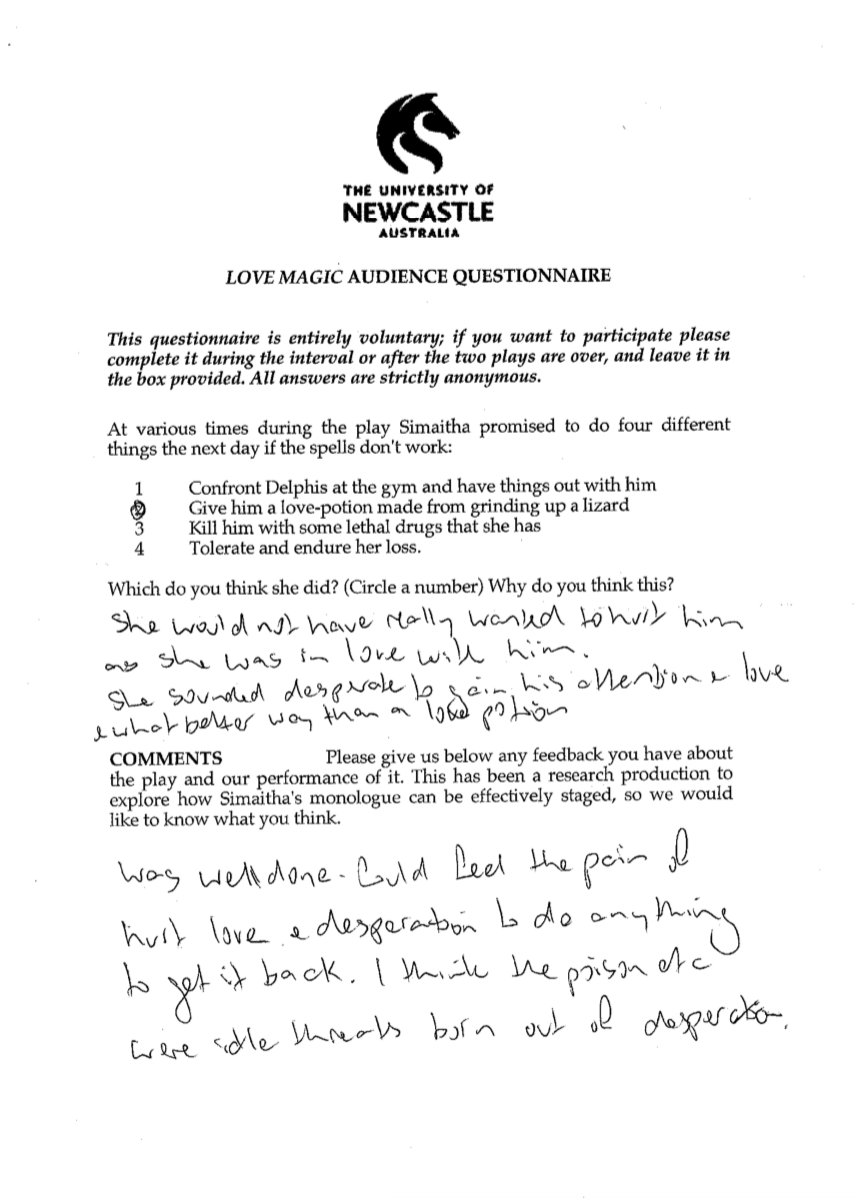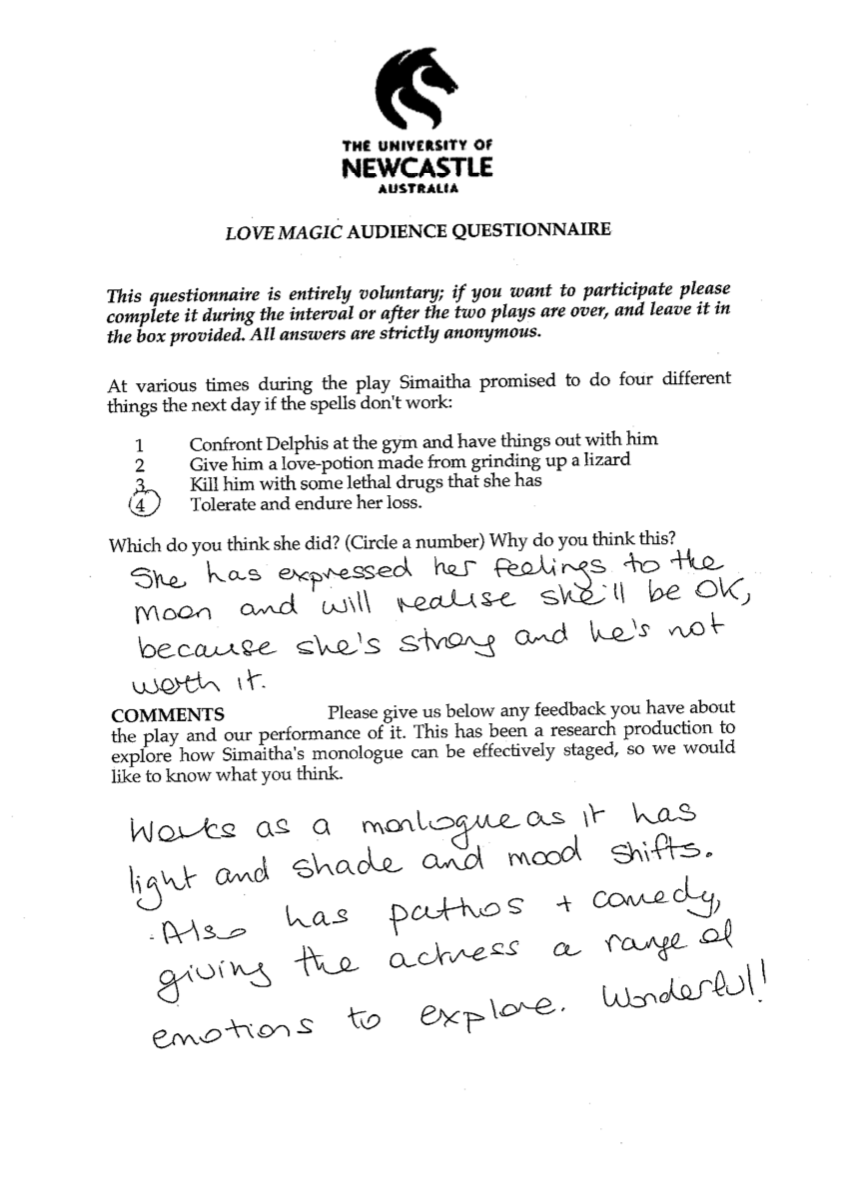Practitioners' Voices in Classical Reception Studies
ISSN 1756-5049
You are here
- Home
- Theatrical Commentary and Audience Response
Theatrical Commentary and Audience Response

Theatrical Commentary
(All references below relate to the performance text of Love Magic by Michael Ewans)
Introduction
Simaitha enters from upstage, talking over her shoulder to Thestylis and then turning towards her. A new beat begins at line 4; Simaitha stands still and addresses the audience (Siobhan gestured decisively on 'I shall go tomorrow...'), and then moves confidently on l. 10 to behind the fire, which we placed a little behind centre stage. Probably, in the original performance, the fire was not physically present, but we used this one prop to aid our audience's imaginations. First she supplicates the Moon, and then (arms extended downwards) Hekate before kneeling behind the fire on ll. 15-16.
The magic wheel incantation was delivered each time in our production with a ritualistic gesture – a wide circular sweeping motion of both arms, ending with them both extended outwards.
Stanza 1
Simaitha optimistically begins the ritual, but Thestylis is tardy and provokes the fierce abuse that was often addressed to slaves in ancient Greece (cf. e.g. Aristophanes Lysistrata 1215ff. and Herodas Mime 5).
Stanza 2
As she begins the first line Simaitha mimes picking up a bowl of bay leaves and after l. 23 tips them into the fire [1].
Stanza 3
As she begins the first line, Simaitha mimes picking up a wax doll (from a different place in front of her than where she has just deposited the empty bowl from the bay leaves), and after l. 29 casts it into the fire.
Stanza 4
Simaitha is about to pick up the cornhusks. But suddenly the howling of dogs indicates that her magic has aroused Hekate, and she needs to defend herself against the presence of the goddess. This stanza is easily staged today, with a barking dogs sound effect and the stage manager striking a gong offstage when Simaitha orders Thestylis to do this. Theocritus' actor would have had to mime horror and panic.
Simaitha should pause a moment, recovering from the incident, before repeating the refrain.
Stanza 5
Another, slightly longer pause is appropriate before Simaitha is satisfied that all is calm again, and meditates on her fate.
Stanza 6
Simaitha picks up a goblet and pours a libation beside the fire. (She says she is making an offering three times and telling the goddess her wish three times; but as she only tells the wish once, one libation may also stand for three.)
Stanza 7
To be delivered with a slightly manic enthusiasm.
Stanza 8
An evil look in her eye and an eager tone on l. 53 as Simaitha picks up the piece of cloth - and tears it sadistically on l. 54, casting it into the fire at the end of the line. Then we found it effective for her to partially rise, to kneeling up, for the great outburst of Aiai! and the rest of ll. 55-6.
Stanza 9
After the refrain Simaitha stands up for this stanza, picking up a bowl of herbs and crossing to one side to give Thestylis her instructions. She hands the bowl to Thestylis after l. 61 and repeats the refrain one last time [2].
Stanzas 10-11
To mark the transition to her narrative to the Moon (and the audience), Simaitha should pause, and cross to a new area of the stage, the opposite side from that on which she had interacted with Thestylis.
Stanza 12
In our production Simaitha came forward, increasingly engrossed in her narrative as she remembers the handsome bodies of Delphis and his companion. Siobhan gave Simaitha a smile of erotic reminiscence on 'they'd just enjoyed a workout at the gym'.
Stanzas 13-14
Simaitha changes tone violently as she dramatizes her physical pain.
Stanza 15
To stage her narrated address to Thestylis, we had Simaitha return towards the place from which she had addressed the 'real' Thestylis earlier, and she delivered the lines facing the place where Thestylis had been imagined as being.
Stanza 16
However, she turns abruptly to face the audience on l. 102, 'That's what I said'.
Stanza 17
This stanza drawing on Sapphic imagery (from fragment 31) needs a tone as if Simaitha can hardly believe what happened to her.
Stanzas 18-21 (and lines 136-37)
Simaitha needs to alternate both vocally and physically between her own refrains and the portrait of Delphis as a very self-confident young man (and a convincing liar). Masculine body language is essential during his reported speech – e.g. swaggering, hands on hips, clenched fists and athletic gestures.
Conclusion
A move to another part of the playing space is appropriate for the narrative of the sex scene (ll.138-43), which must be delivered with the remembrance of ecstasy. And then there should be a change to a bleak, despairing and almost angry tone and another move, probably to front centre, for the final part of Simaitha's story (ll.144-58). L.154 should be sad, and l.156 another pleasant reminiscence. Next a touch of wistful pathos is needed on l.158, to contrast with the sudden, rising power of her threat to murder Delphis, ll.159-62. And after that a strong contrast is needed again from that violence to Simaitha's resigned farewell to the Moon and stars, ll.163-66.
Notes
- [1] Note that these bay leaves have miraculously appeared, despite apparently having been missing in the first line of the play. Another literal impossibility!
- [2] A spurious line has been inserted in our texts after 60, and has not been translated.
Audience response
What did Simaitha do the next day? I incline to the view that she remained determined to tolerate her lot, as she says at the end of the play; but we deliberately left it open-ended in the production, and invited the audience to speculate in an optional questionnaire:
"At various times during the play Simaitha promised to do four different things the next day if the spells don't work:
- Confront Delphis at the gym and have things out with him
- Give him a love-potion made from grinding up a lizard
- Kill him with some lethal drugs that she has
- Tolerate and endure her loss.
Which do you think she did? (Circle a number) Why do you think this?"
The results were fascinatingly diverse. 27 respondents shared my view and voted for option 4; option 1 attracted only one vote, but the remainder (apart from a few invalid votes cast for more than one option) were split quite closely between option 2 (16 votes) and option 3 (12). So, there was complete disagreement; the majority felt that Simaitha's last expressed position, tolerating and submitting to her longing, was indeed final; one respondent said that this was because 'The process of spell casting allowed her to move on with her life', echoing Marguerite Johnson's view that ancient magic was cathartic for the practitioner. Then there were those who felt that she was driven by revenge and would fulfill her threat to kill Delphis (e.g. 'Because she didn't want anyone else to have him'); and finally, those who felt that she would pursue option 2, e.g. because 'she was drunk in love. Is under his spell [an interesting metaphor!] and would do anything for his love'. This audience division reflects the way in which during the first part of the play Simaitha oscillates between casting spells to bring Delphis to her and spells to inflict harm on him.
The general reaction to the play (apart from warm acclamation of Siobhan Caulfield's performance) was a delighted surprise that it had not dated, but the issues and the heroine's predicament came across as freshly as if it had been written by one of our contemporaries. I had hoped that the audiences would 'learn from Simaitha's impassioned performance how little the human heart has changed', and that quote from the program was echoed by several questionnaire respondents; one simply wrote: 'Great stuff – could be 2019'. Theocritus captures perfectly how passionate love followed by loss has a devastating effect on young people. And the two young women who worked on the production (the actress and the research assistant/body art painter) both felt that Theocritus shows great insight and real understanding of the psychology of their age group.
Two examples of completed questionnaires:

